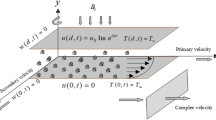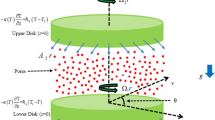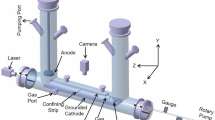Abstract
IN a recent article, Sproull1 describes some experiments in which he measured the torque with air in a rotating cylinder viscometer and found a significant reduction of torque when the air was dusty. He attributes this to the viscosity of dusty air being less than that of clean air because the dust particles reduce the mean free path of the air molecules. However, this explanation is difficult to understand, and in any event contradicts the Einstein formula2 for the viscosity of a suspension, according to which the viscosity will increase in proportion with the bulk concentration of the dust.
This is a preview of subscription content, access via your institution
Access options
Subscribe to this journal
Receive 51 print issues and online access
$199.00 per year
only $3.90 per issue
Buy this article
- Purchase on Springer Link
- Instant access to full article PDF
Prices may be subject to local taxes which are calculated during checkout
Similar content being viewed by others
References
Sproull, W. T., Nature, 190, 976 (1961).
Landau, L. D., and Lifshitz, E. M., Fluid Mechanics, 76 (Pergamon Press, London, 1959).
Lamb, H., Hydrodynamics, sixth ed., Sec. 337 (Camb. Univ. Press, 1932).
Author information
Authors and Affiliations
Rights and permissions
About this article
Cite this article
SAFFMAN, P. Flow of a Dusty Gas between Rotating Cylinders. Nature 193, 463–464 (1962). https://doi.org/10.1038/193463a0
Issue Date:
DOI: https://doi.org/10.1038/193463a0
This article is cited by
-
The compressible gas-solid particle flow over a semi-infinite flat plate
Zeitschrift für angewandte Mathematik und Physik ZAMP (1965)
Comments
By submitting a comment you agree to abide by our Terms and Community Guidelines. If you find something abusive or that does not comply with our terms or guidelines please flag it as inappropriate.



